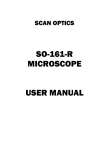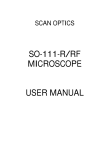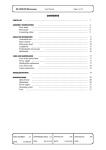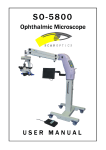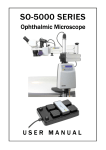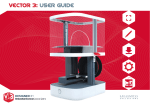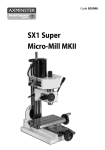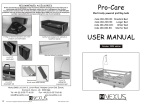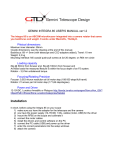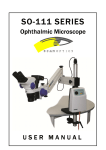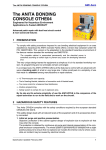Download - Frank`s Hospital Workshop
Transcript
SO-161 Ophthalmic Microscope Page 1 of 25 User Manual Page 1 of 25 CONTENTS PARTS LIST .................................................................................................................... 4 UNPACKING AND INSTALLATION ............................................................................................ 5 12 Volt dc supply ............................................................................................ Connecting the power supply to a 12 Volt dc supply (battery) 11 ................................ 12 ........................................................ 12 ............................................................................................ 13 Initial Positioning ............................................................................................ 13 Positioning during use ............................................................................................ 13 ........................................................................................................ 14 DISMANTLING AND REPACKING THE MICROSCOPE USE OF THE MICROSCOPE Sterilisation CARE AND MAINTENANCE ............................................................................................ 15 Care of the optical head ............................................................................................ 15 Fuse change 15 ........................................................................................................ Care of the lamp ............................................................................................ 16 Lamp replacement ............................................................................................ 16 ........................................................................................................ 17 Power Supply ........................................................................................................ 17 Mould Pellet Replacement ....................................................................................... 18 Focus friction BINOCULAR ASSISTANT MICROSCOPE ................................................................................ Mounting the Binocular Assistant Microscope 19 ........................................................ 20 TROUBLESHOOTING ........................................................................................................ 22 SPECIFICATIONS ........................................................................................................ 24 Optical head ........................................................................................................ 24 Lamphouse ........................................................................................................ 24 Power Supply ........................................................................................................ 25 Mounting system .................................................................................................. 25 Carton .................................................................................................................... 25 ISSUE NUMBER: DATE: 5.0 11/04/04 SUPERSEDES ISSUE: 4.1 WRITTEN BY: DATE: DATE: 02/01/02 RJK 05/11/97 CHECKED BY: DATE: RDW 05/11/97 SO-161 Ophthalmic Microscope Page 2 of 25 User Manual Page 2 of 25 LIST OF FIGURES Figure 1 Scan Optics SO-161 Ophthalmic Microscope Figure 2 Setting the mains voltage Figure 3 Attaching the clamp assembly to the mounting surface Figure 4 Attaching the arm assembly Figure 5 Attaching the microscope assembly .................................................... 7 Figure 6 Connecting the lamphouse cable ................................................................ 8 Figure 7 Connecting the power supply 9 Figure 8 Inserting the eyepieces and rough focusing Figure 9 Inserting the focus control covers Figure 10 Mould pellet replacement Figure 11 Binocular Assistant Microscope Figure 12a Changing the assistant microscope configuration ............................ 20 Figure 12b Changing the assistant microscope configuration ............................ 20 ISSUE NUMBER: DATE: 5.0 11/04/04 ........................................ 3 ................................................................ 5 ............................ 6 ................................................................ 6 ................................................................ ........................................ 10 .................................................... 11 ................................................................ 18 .................................................... 19 SUPERSEDES ISSUE: 4.1 WRITTEN BY: DATE: DATE: 02/01/02 RJK 05/11/97 CHECKED BY: DATE: RDW 05/11/97 SO-161 Ophthalmic Microscope Page 3 of 25 Figure 1 ISSUE NUMBER: DATE: 5.0 11/04/04 User Manual Page 3 of 25 Scan Optics SO-161 Ophthalmic Microscope SUPERSEDES ISSUE: 4.1 WRITTEN BY: DATE: DATE: 02/01/02 RJK 05/11/97 CHECKED BY: DATE: RDW 05/11/97 SO-161 Ophthalmic Microscope Page 4 of 25 User Manual Page 4 of 25 INSTRUCTIONS AND SPECIFICATIONS Please read the following information carefully before installing and using the Scan Optics Ophthalmic microscope. Scan Optics is responsible for the safety, reliability and performance of the equipment only if it is used in accordance with these instructions. PARTS LIST MAIN ASSEMBLIES Clamp assembly (includes power supply, clamp, pillar and safety clamp) Arm assembly (includes horizontal arm and adjustable pantograph arm) Microscope assembly (includes microscope head, lamphouse and tilt adjuster) CABLES Lamphouse cable Mains power cable 12V dc supply (battery) cable OTHER Microscope eyepieces (located in the tool box) (2) Focus control covers (4) TOOL KIT Spare lamps (1) Spare fuses (2) Socket keys (7) Lens cloth OPTIONAL ACCESSORIES SCAN OPTICS PART NUMBER Binocular assistant microscope Auxiliary light source Table plate SO-1420 SO-232 SO-291 ISSUE NUMBER: DATE: 5.0 11/04/04 SUPERSEDES ISSUE: 4.1 WRITTEN BY: DATE: DATE: 02/01/02 RJK 05/11/97 CHECKED BY: DATE: RDW 05/11/97 SO-161 Ophthalmic Microscope Page 5 of 25 User Manual Page 5 of 25 UNPACKING AND INSTALLATION 1. Remove the clamp assembly from the carton. 2. Check that the power supply is set to the correct mains voltage (110-120V or 220-240V), by noting the position of the indicator on the power supply near the mains input plug housing (see figure 2). Severe damage can occur if the setting is incorrect. M If the mains voltage indicator is not correctly set, reposition it using a coin. Figure 2 3. Fix the clamp to the operating table about 40 cm from the head of the table. The clamp may be fixed on either side of the table. Make sure that the clamp is pressed firmly against the side of the table before tightening (see figure 3). ISSUE NUMBER: DATE: Setting the mains voltage M Alternatively, the clamp may be mounted on any horizontal surface that can be positioned within 60 cm of the working position, such as a mobile trolley. M It is important that the mounting surface be free from vibration and movement. 5.0 11/04/04 SUPERSEDES ISSUE: 4.1 WRITTEN BY: DATE: DATE: 02/01/02 RJK 05/11/97 CHECKED BY: DATE: RDW 05/11/97 SO-161 Ophthalmic Microscope Page 6 of 25 4. Attaching the clamp to the mounting surface Remove the arm assembly from the carton, and place it on the pillar. Make sure that the arm assembly rests against the safety clamp (see figure 4). Figure 4 ISSUE NUMBER: DATE: Page 6 of 25 Tighten the safety clamp at a point about midway up the pillar (see figure 3). Figure 3 5. User Manual 5.0 11/04/04 Attaching the arm assembly SUPERSEDES ISSUE: 4.1 WRITTEN BY: DATE: DATE: 02/01/02 RJK 05/11/97 CHECKED BY: DATE: RDW 05/11/97 SO-161 Ophthalmic Microscope Page 7 of 25 6. Page 7 of 25 Remove the microscope assembly from the carton and locate it in the end of the arm assembly. Tighten the collet knob to secure the microscope (see figure 5). Figure 5 ISSUE NUMBER: DATE: User Manual 5.0 11/04/04 Attaching the microscope assembly SUPERSEDES ISSUE: 4.1 WRITTEN BY: DATE: DATE: 02/01/02 RJK 05/11/97 CHECKED BY: DATE: RDW 05/11/97 SO-161 Ophthalmic Microscope Page 8 of 25 7. Page 8 of 25 Attach the female socket on the lamphouse cable to the connector on the side of the lamphouse and plug into the power supply (see figure 6). Figure 6 ISSUE NUMBER: DATE: User Manual 5.0 11/04/04 Connecting the lamphouse cable SUPERSEDES ISSUE: 4.1 WRITTEN BY: DATE: DATE: 02/01/02 RJK 05/11/97 CHECKED BY: DATE: RDW 05/11/97 SO-161 Ophthalmic Microscope Page 9 of 25 8. The mains power supply must have a protective earth conductor. If there in no earth conductor, or if the integrity of the earth conductor arrangement is in doubt, the equipment must be operated from a 12Vdc power source. Figure 7 Connecting the Power Supply Switch on the mains power supply at the wall socket. M ISSUE NUMBER: DATE: Page 9 of 25 Plug the mains power cable into the power supply and into a mains power socket. International safety standards do not allow the use of an extension cord (see figure 7). M 9. User Manual When the ON/OFF switch is selected to ON, the Power Supply indicator will light. 5.0 11/04/04 SUPERSEDES ISSUE: 4.1 WRITTEN BY: DATE: DATE: 02/01/02 RJK 05/11/97 CHECKED BY: DATE: RDW 05/11/97 SO-161 Ophthalmic Microscope Page 10 of 25 10. 11. M Retain the eyepiece blanks for repacking the microscope. Do not discard the eyepiece blanks. M Take care to protect the lamphouse prism at all times. If placing the microscope assembly on a bench, lie carefully on one side. Focus the microscope roughly by moving the arm up or down to the best vertical position (see figure 8). Inserting the eyepieces and rough focusing Check that the eyepieces are located at a comfortable viewing level. If not, rotate the tilt adjustment knob clockwise to tilt the microscope assembly down, or anticlockwise to tilt the microscope assembly up.. ISSUE NUMBER: DATE: Page 10 of 25 Remove the microscope eyepiece blanks and insert the eyepieces (see figure 8). Figure 8 12. User Manual 5.0 11/04/04 SUPERSEDES ISSUE: 4.1 WRITTEN BY: DATE: DATE: 02/01/02 RJK 05/11/97 CHECKED BY: DATE: RDW 05/11/97 SO-161 Ophthalmic Microscope Page 11 of 25 13. Page 11 of 25 Remove two focus control covers from the bag inside the carton. Push them into position on the focus control knobs (see figure 9). M Focus control covers are intended to be sterilised before any operating procedures. Figure 9 14. User Manual Inserting the focus control covers Switch on the power supply and observe the light patch produced. The light patch will not have sharp edges but should be brightest in the centre. If the patch of light is brighter to one side, it can be easily adjusted. Insert a 3mm socket key in the hole in the lamphouse cover above the ‘bulb adjust’ label, so that it engages in the socket of the adjusting screw. With the lamp on, turn the screw a small amount to the left or right until the patch of light is even. 12 VOLT DC SUPPLY The Scan Optics Ophthalmic Microscope may be connected to either an earthed mains (110-120V or 220-240V) ac supply, or a 12V dc supply, or both. If both supplies are connected, the battery will act as an emergency backup for mains power. In this case, the microscope will not run from battery power unless the mains supply fails or falls by more than 20 percent, or is switched off. If mains power is restored, the microscope will resume using mains power automatically. The mains power switch on the microscope does not switch the battery off. There is some reduction in light output when the battery is connected through the Power Supply. If the 12V supply is to be used in isolation, or if the mains power has completely failed, the light output may be increased by connecting the battery cable directly to the lamphouse cable, bypassing the power supply. ISSUE NUMBER: DATE: 5.0 11/04/04 SUPERSEDES ISSUE: 4.1 WRITTEN BY: DATE: DATE: 02/01/02 RJK 05/11/97 CHECKED BY: DATE: RDW 05/11/97 SO-161 Ophthalmic Microscope User Manual Page 12 of 25 Page 12 of 25 CONNECTING THE POWER SUPPLY TO A 12-VOLT DC SUPPLY (BATTERY) 1. If the power supply is to be connected to a 12-volt dc supply, remove the battery cable from the carton. 2. Connect the cable to the 12-volt connector on the underside of the power supply (see figure 7). 3. Connect the red battery clip to the positive battery terminal, and the black clip to the negative battery terminal. The power supply will not operate if the terminals are reversed (see figure 7). M Earthing is not required when a 12-volt supply is used alone. M The 12-volt supply must be direct current. The power supply will not operate with 12 volts alternating current. M A battery with 7 amp hour capacity, such as a motor cycle or emergency lighting battery will provide about 3.5 hours life at the maximum brightness setting. DISMANTLING AND REPACKING THE MICROSCOPE 1. Switch off the mains power. 2. Remove the mains power and 12-volt cables and repack. 3. Remove the microscope eyepieces and replace them in the toolbox. This will ensure the eyepieces are not dropped when the microscope assembly is removed. 4. Insert the eyepiece blanks in the microscope assembly. 5. Unplug the lamphouse cable from the power supply. 6. Reset the focus adjustment all the way down. 7. Remove the focus control covers and repack or sterilise immediately if necessary. 8. Remove the microscope assembly and carefully repack. Take care to protect the lamphouse prism. 9. Remove the arm assembly, and rotate the arm about the elbow until it lies parallel with the horizontal arm. Push the arm down flat and tighten the arm lock to keep it flat. Repack the arm assembly in the carton. 10. Unclamp the remaining assembly from the table and slide the safety clamp down. Replace the clamp assembly in the carton. ISSUE NUMBER: DATE: 5.0 11/04/04 SUPERSEDES ISSUE: 4.1 WRITTEN BY: DATE: DATE: 02/01/02 RJK 05/11/97 CHECKED BY: DATE: RDW 05/11/97 SO-161 Ophthalmic Microscope Page 13 of 25 User Manual Page 13 of 25 USE OF THE MICROSCOPE The equipment must be located more than 25 cm away from any medical gas system or disinfection or degreasing system containing flammable vapour. The Power Supply must also be protected from liquid splashes and spills. All knobs may be sterilised. However, it may be convenient for the clamp knobs to be set by a non-sterile person. INITIAL POSITIONING 1. Set the instrument approximately in position by swinging the elbow as required. 2. Set the focus adjustment to the midway position by aligning the focus mid-position marks on the fixed and moving parts of the focusing system. 3. Adjust the height of the microscope by moving the arm vertically so that the work area is approximately in focus. Tighten the arm and elbow knobs. 4. Check the eyepiece setting to ensure clear vision with each eye separately, and set the pupillary distance. 5. The microscope can now be swung aside. POSITIONING DURING USE 1. Swing the microscope over the patient 2. Hold the focus control knobs to move the microscope to the correct position. The most accurate focusing can be obtained at the highest magnification, as the depth of focus is then minimised. 3. Tighten the pillar lock knob until the microscope is prevented from moving freely, but is still able to be moved when required. The friction of the arm and elbow knobs should be adjusted so that the movement feels uniform in all directions. 4. Focus the microscope by moving the optical head or by turning the focus control knobs. 5. To swing the microscope out of the way, undo the pillar lock knob and swing the microscope about the pillar. It will remain in focus when returned to the work area. ISSUE NUMBER: DATE: 5.0 11/04/04 SUPERSEDES ISSUE: 4.1 WRITTEN BY: DATE: DATE: 02/01/02 RJK 05/11/97 CHECKED BY: DATE: RDW 05/11/97 SO-161 Ophthalmic Microscope Page 14 of 25 User Manual Page 14 of 25 CAUTION: When the Microscope is in use it is essential that: M The collet knob which locks the microscope head to the arm is securely tightened. M The safety clamp is positioned directly under the fixed arm and is locked. Failure to observe these precautions may allow the microscope head to fall, with risk of harm to the patient STERILISATION The detachable focus control covers may be sterilised by: M boiling M autoclaving M chemical sterilisation M gas sterilisation. The anodised and plated metal components can be wiped with any of the normal disinfectants. The plastic parts and the paintwork of the microscope assembly and the power supply may be affected by organic solvents. Do not autoclave or wipe with organic solvents such as ether, xylene or alcohol; to clean use water-based solvents only. One set of focus control covers can be sterilised while the other is in use. NOTE: National authorities may require the use of specific sterilisation or disinfection methods. ISSUE NUMBER: DATE: 5.0 11/04/04 SUPERSEDES ISSUE: 4.1 WRITTEN BY: DATE: DATE: 02/01/02 RJK 05/11/97 CHECKED BY: DATE: RDW 05/11/97 SO-161 Ophthalmic Microscope Page 15 of 25 User Manual Page 15 of 25 CARE AND MAINTENANCE CARE OF THE OPTICAL HEAD 1. Cleaning the optical components. The eyepieces should be checked for cleanliness each time the instrument is used. Surface dust should be removed with a clean, soft brush. Fingerprints or grease may be removed by lightly wiping with a cotton cloth or lens tissue moistened with a 70:30 mixture of absolute alcohol (either ethanol or methanol) and ether. Do not use acetone as it may damage the surface coating. 2. Cleaning the plastic parts and paintwork. Use water based cleaners only. Do not use any organic solvent such as alcohol, ether or xylene. 3. Protection against mould. In hot and humid climates it is common for mould to grow on optical surfaces. Cleaning and repairing the damage can be expensive and inconvenient. To minimise the risk of mould forming, do not leave the instrument without either eyepieces or eyepiece blanks inserted and always store the optical head in a sealed bag containing silica gel desiccant. In tropical climates, routine annual maintenance of the optical head is recommended. 4. Do not dismantle. No parts inside the optical head of the instrument can be serviced by the user. Attempts to dismantle the optical head or prism cover will make any warranty void. FUSE CHANGE 1. Turn off the mains power at the switch and remove the mains power cable as a precaution. 2. Open the fuse housing on the underside of the power supply with a coin or screwdriver. 3. Remove the old fuse, checking for failure. 4. Replace the fuse with an M205 (20 x 5mm) anti-surge type fuse, rated at 1 amp and 240 volts. Do not replace the fuse with a fuse of a higher rating. 5. Secure the fuse housing with the coin or screwdriver. 6. Replace the mains power cable and switch on to check operation. ISSUE NUMBER: DATE: 5.0 11/04/04 SUPERSEDES ISSUE: 4.1 WRITTEN BY: DATE: DATE: 02/01/02 RJK 05/11/97 CHECKED BY: DATE: RDW 05/11/97 SO-161 Ophthalmic Microscope Page 16 of 25 CARE OF THE LAMP User Manual Page 16 of 25 The lamp supplied has a rated average life of 2,000 hours. The actual life of the lamp will depend on the intensity setting normally used. The highest setting is an over-run setting which increases light output but reduces lamp life to about 350 hours. It is strongly recommended that the lamp be replaced as a routine maintenance task, to reduce the possibility of failure during surgery. The Scan Optics Ophthalmic Microscope uses lamps that are readily available in most countries. LAMP REPLACEMENT 1. Ensure that the lamphouse and lamp are cool to the touch. 2. Remove the lamphouse door by placing both thumbs in the groove and pushing in the direction of the ‘push to open’ label. Pry the lamp from the lamp holder. 3. Replace the lamp with a new lamp. 4. M The replacement lamp must be rated for 12 volts and not more than 20 watts. Use of a lamp of higher wattage may cause damage. M The lamp must be handled with gloves or a tissue. If touched with bare fingers, it must be cleaned with alcohol before switching on or the life of the lamp may be substantially reduced. There may be some variation in the position of the filament with different lamps. When the lamp is replaced it may be necessary to adjust the lamp position in the lamp holder, to ensure that the filament is correctly centred and so produce a uniform area of illumination. M In general, a clearance of about 1mm will be needed between the envelope of the lamp and the lamp holder. 5. Replace the lamphouse door by pushing it back into place. 6. Switch on the power supply and observe the light patch produced. If the patch of light is brighter to one side, it can be easily adjusted. Insert a 3mm socket key in the hole in the lamphouse cover above the ‘bulb adjust’ label, so that it engages in the socket of the adjusting screw. With the lamp on, turn the screw a small amount to the left or right until the patch of light is even. Small amounts of adjustment should be sufficient. Do not force the screw. ISSUE NUMBER: DATE: 5.0 11/04/04 SUPERSEDES ISSUE: 4.1 WRITTEN BY: DATE: DATE: 02/01/02 RJK 05/11/97 CHECKED BY: DATE: RDW 05/11/97 SO-161 Ophthalmic Microscope Page 17 of 25 FOCUS FRICTION User Manual Page 17 of 25 The focusing system should allow the microscope head to be lowered and raised smoothly and easily, but should not allow the head to fall under its own weight. The friction of the focusing system may be adjusted as follows: M Simply hold the plain (left) focus control knob and rotate the right focus control knob (marked “tension”) until the desired friction is achieved. To increase the friction rotate the knob clockwise, to decrease the friction rotate the knob anti-clockwise. POWER SUPPLY In many countries the mains voltage fluctuates widely. Low voltage can greatly reduce the light output, and high voltage can greatly reduce lamp life. The Scan Optics power supply provides a constant voltage to the lamp for a wide range of mains power voltages. Quartz halogen lamps have very low resistance when cold. The starting current can thus be very high, and the lamp filament may fail when turned on. The Scan Optics power supply provides a "soft start" with a ramped initial voltage to increase lamp life. ISSUE NUMBER: DATE: 5.0 11/04/04 SUPERSEDES ISSUE: 4.1 WRITTEN BY: DATE: DATE: 02/01/02 RJK 05/11/97 CHECKED BY: DATE: RDW 05/11/97 SO-161 Ophthalmic Microscope Page 18 of 25 MOULD PELLET REPLACEMENT 1. 2. 3. 4. 5. 6. 7. User Manual Loosen the grubscrews (no. 1 below) holding the head (2) into the bonder arm (4). Lift the head out of the arm and remove the prism protector (3). Carefully unscrew the objective lens, taking care not to damage the lamp house prism. Use a Philips head screwdriver to remove the mould pellet (5). Push the end into the hole and lever off the surface. Place the new pellet on the end of the screwdriver, remove the protective cover and fix to the same location that the old pellet was removed from. Screw the objective lens back on and replace the prism protector making sure that the prism slot is over the prism (6). Replace the head in the bonder arm ensuring that the head is aligned to the front of the arm and secure by tightening the grubscrews. Figure 10 ISSUE NUMBER: DATE: Page 18 of 25 5.0 11/04/04 Mould pellet replacement SUPERSEDES ISSUE: 4.1 WRITTEN BY: DATE: DATE: 02/01/02 RJK 05/11/97 CHECKED BY: DATE: RDW 05/11/97 SO-161 Ophthalmic Microscope Page 19 of 25 User Manual Page 19 of 25 BINOCULAR ASSISTANT MICROSCOPE The optional assistant microscope allows an observer to view procedures under magnification within close proximity of the operating field. In order to fit the assistant microscope, first attach the mounting bracket provided to one side of the microscope head using the four M5x10 socket head cap screws provided. Then insert the mounting arm and secure it with the locking pin. Refer to figure 11. Sterilisable covers are provided to fit over the focus knobs. Pupillary distance adjustment is performed manually, but the eyepieces are not geared together. For the best user comfort, ensure that the eyepieces are equidistant from the central axis of the main optical path. The adjustable eyepiece may be used to compensate for any refractive error difference between the left and right eye of the user. First, rotate the adjustable (left) eyepiece so that there are equal amounts of adjustment on either side. Then focus the microscope while closing the left eye and looking only through the right eyepiece. When the microscope is focussed, close the right eye and look with the left eye through the left eyepiece, and rotate the adjusting ring until the left eye is focussed. When the microscope is fitted to the side of the main microscope head, a tilt angle of approximately 30 degrees will enable the visual field of the assistant microscope to match that of the main microscope head. To adjust this angle, loosen the angle lock knob while holding the microscope head, tilt the head to the appropriate angle and lock it again. Small sideways adjustments of the visual field can be achieved by loosening the microscope lock knob and rotating the microscope head about its mounting axis. When the fields are aligned correctly, tighten the microscope lock knob once again. LOCKING PIN MICROSCOPE HEAD MICROSCOPE LOCK KNOB FOCUS KNOBS ANGLE LOCK KNOB MOUNTING ARM MICROSCOPE MOUNT Figure 11 ISSUE NUMBER: DATE: 5.0 11/04/04 Binocular Assistant Microscope SUPERSEDES ISSUE: 4.1 WRITTEN BY: DATE: DATE: 02/01/02 RJK 05/11/97 CHECKED BY: DATE: RDW 05/11/97 SO-161 Ophthalmic Microscope Page 20 of 25 User Manual Page 20 of 25 MOUNTING THE BINOCULAR ASSISTANT MICROSCOPE The assistant microscope may be configured to mount on either the left or right side of the main microscope head. Figure 11 shows the head configured to fit on the right hand side of the microscope head. In order to swap the mounting configuration follow figures 12a and 12b shown. UNSCREW THE MICROSCOPE LOCK KNOB LIFT THE MICROSCOPE ASSEMBLY CLEAR OF THE MICROSCOPE MOUNT TIGHTEN THE MICROSCOPE LOCK KNOB AGAIN ROTATE THE MICROSCOPE AROUND THE MOUNTING SHAFT UNTIL IT FACES THE OPPOSITE DIRECTION Figure 12a ISSUE NUMBER: DATE: 5.0 11/04/04 Changing the assistant microscope configuration SUPERSEDES ISSUE: 4.1 WRITTEN BY: DATE: DATE: 02/01/02 RJK 05/11/97 CHECKED BY: DATE: RDW 05/11/97 SO-161 Ophthalmic Microscope Page 21 of 25 User Manual Page 21 of 25 UNSCREW THE ANGLE LOCK KNOB SO THAT THE SAFETY PINS CAN BE DISENGAGED ROTATE THE MOUNTING ARM TIGHTEN THE ANGLE LOCK KNOB AGAIN Figure 12b ISSUE NUMBER: DATE: 5.0 11/04/04 Changing the assistant microscope configuration SUPERSEDES ISSUE: 4.1 WRITTEN BY: DATE: DATE: 02/01/02 RJK 05/11/97 CHECKED BY: DATE: RDW 05/11/97 SO-161 Ophthalmic Microscope Page 22 of 25 User Manual Page 22 of 25 TROUBLESHOOTING 1. SYMPTOM CAUSE REMEDY Lamp does not operate Blown fuse Check power indicator light on switch, (if fuse blown, indicator light will not glow) check and replace fuses as necessary Mains power failure Check power indicator light on switch, use 12V dc battery Battery failure Check battery voltage and replace or recharge as necessary Battery terminals incorrectly wired Wire terminals correctly (red (+) positive; black (-) negative) Lamp failure Replace lamp 2. Mains fuse blows repeatedly Mains voltage incorrectly set Set mains voltage to correct setting 3. Lamp dim Battery low Recharge battery Lamp filament not centred Adjust lamp position to centre filament Lamp blackened Replace lamp Mains voltage incorrectly set Set mains voltage to correct setting Mould on optical surfaces If mould is evident, return microscope to Scan Optics for servicing Stiff focus knob Adjust focus friction Focus system falls under own weight Adjust focus friction Dirty eyepieces Clean eyepieces Mould on optical surfaces If mould is evident, return microscope to Scan Optics for servicing 4. 5. Focusing difficult Blurred view ISSUE NUMBER: DATE: 5.0 11/04/04 SUPERSEDES ISSUE: 4.1 WRITTEN BY: DATE: DATE: 02/01/02 RJK 05/11/97 CHECKED BY: DATE: RDW 05/11/97 SO-161 Ophthalmic Microscope Page 23 of 25 SYMPTOM CAUSE 6. 7. Microscope unstable Microscope uncomfortable to use ISSUE NUMBER: DATE: 5.0 11/04/04 User Manual Page 23 of 25 REMEDY G-clamp loose Tighten G-clamp Mounting surface unstable Use more rigid mounting surface Arm/Elbow will not lock in place Check presence of friction (curved) washers interleaved with flat washers under Arm/Elbow knob(s) Microscope head movement/vibration Check microscope correctly seated in collar Eyepieces too high Rotate tilt knob to tilt as necessary SUPERSEDES ISSUE: 4.1 WRITTEN BY: DATE: DATE: 02/01/02 RJK 05/11/97 CHECKED BY: DATE: RDW 05/11/97 SO-161 Ophthalmic Microscope Page 24 of 25 User Manual Page 24 of 25 SPECIFICATIONS OPTICAL HEAD VIEWING SYSTEM Binocular, stereoscopic (convergence angle 12o ) Eyepiece tube inclination 45o MAGNIFICATION Fixed, 6.25 x Optional 9.4 x eyepieces WORKING DISTANCE Lamphouse prism to object distance 180 mm FIELD OF VIEW 44 mm REFRACTIVE ERROR Correction on left eyepiece ± 5o FOCUSING Range ± 25 mm Control knobs removable for sterilisation INTERPUPILLARY DISTANCE Adjustable for Distance PD range approximately 52 to 75mm LAMPHOUSE ALIGNMENT Coaxial with viewing system LAMP 12V 20W quartz-halogen lamp with G4 base and horizontal filament. Colour temperature 2,925 degrees K Example AVERAGE LAMP LIFE High Intensity (voltage over-run): Medium (rated voltage) LAMP CHANGE Plug in for fast change, no screws ILLUMINATION 35,000 Lux approximately at maximum setting. ISSUE NUMBER: DATE: GE M47 12V 20W Note: this is the only lamp now recommended by Scan Optics as suitable for use in the microscope lamphouse. 5.0 11/04/04 SUPERSEDES ISSUE: 4.1 WRITTEN BY: DATE: DATE: 02/01/02 RJK 05/11/97 350 hours 2,000 hours CHECKED BY: DATE: RDW 05/11/97 SO-161 Ophthalmic Microscope Page 25 of 25 POWER SUPPLY User Manual Page 25 of 25 MAINS POWER 100-120V or 220-240V ac, selectable by external switch on each unit OUTPUT Regulated output with soft start. INTENSITY CONTROL Continuously adjustable EARTHING Via earth lead of power cable (green/yellow) DIRECT CURRENT 12 V dc source optional, automatically selected if mains voltage falls by 20% FUSES M205 (20 x 5mm) 1A at 240 volts rating anti-surge fuse on primary winding of transformer CABLES Mains: Length 5 metres Battery: Length 5 metres MOUNTING SYSTEM CLAMP Opening 75mm, throat 100mm EXTENSION Bed surface to focal plane, maximum 270mm Bed edge to optic axis, maximum 570mm MOUNT SIDE Left or right hand CARTON DIMENSIONS 710 x 530 x 245 mm (28.0 x 20.9 x 9.6") WEIGHT 11.8 kg (26 lbs) When packed with accessories ISSUE NUMBER: DATE: 5.0 11/04/04 SUPERSEDES ISSUE: 4.1 WRITTEN BY: DATE: DATE: 02/01/02 RJK 05/11/97 CHECKED BY: DATE: RDW 05/11/97

























